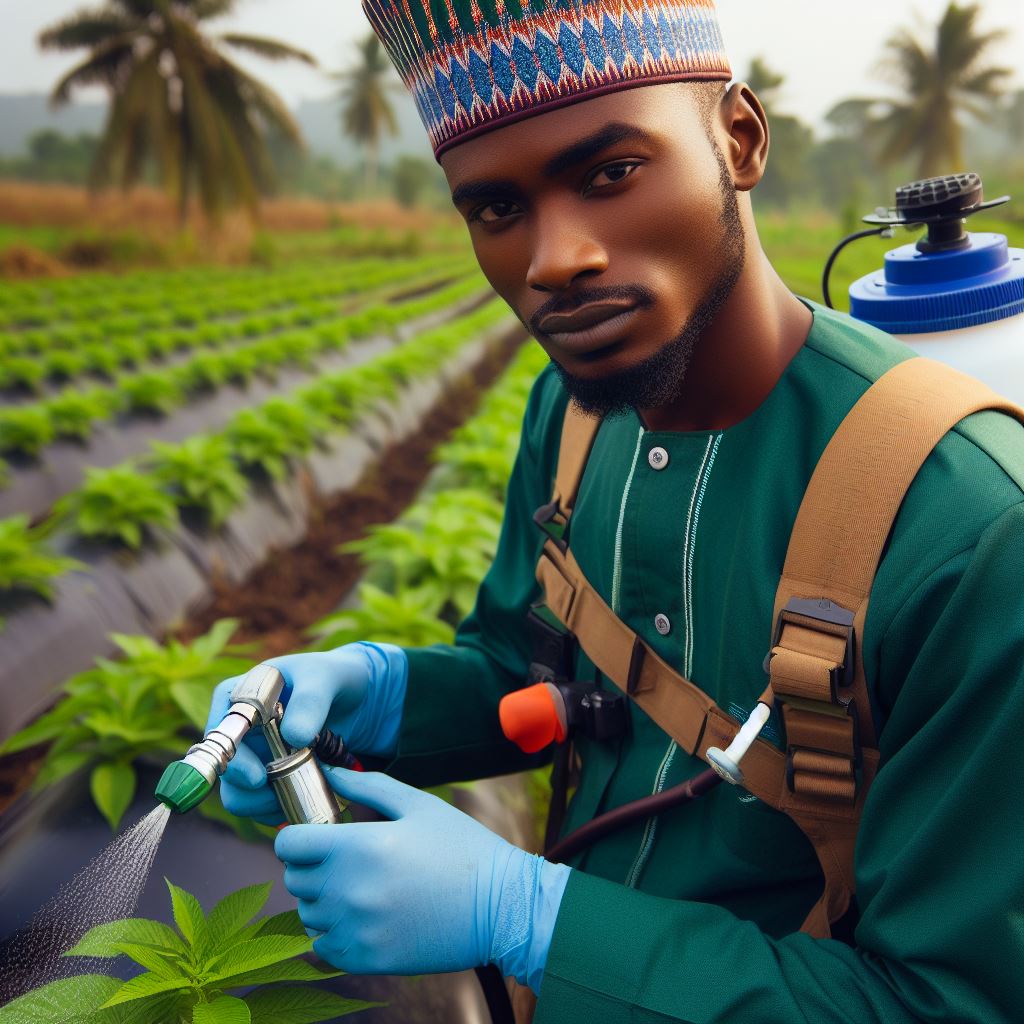Introduction
Importance of Safe Farming Practices
Safe farming practices form the bedrock of sustainable agricultural development.
They ensure the protection of crops, ecosystems, and human health.
Pesticide Use in Nigerian Agriculture
Nigeria heavily relies on pesticides to enhance crop yield and combat pests, weeds, and diseases.
The widespread application of pesticides contributes significantly to agricultural productivity.
Need to Address Pesticide Safety in Nigeria
Despite the benefits, inadequate regulation and misuse pose grave risks.
Improper handling and overuse of pesticides threaten human health, soil fertility, water quality, and biodiversity.
As Nigeria strives for food security and economic growth, addressing pesticide safety emerges as a critical concern.
The country’s agricultural landscape demands a holistic approach to ensure sustainable farming practices.
Pesticide-related health issues, ranging from acute poisoning to chronic illnesses, underline the urgency.
Farmers and agricultural workers face direct exposure risks due to improper protective measures.
Moreover, pesticide residues in food products raise health apprehensions among consumers.
The potential environmental impact, such as water contamination and soil degradation, also necessitates immediate attention.
Acknowledging these challenges, Nigeria is shifting towards integrated pest management (IPM).
This strategy promotes a balanced approach, minimizing pesticide use while incorporating natural pest control methods.
Educating farmers about proper pesticide application, storage, and disposal plays a pivotal role.
Empowering them with knowledge and alternative pest management strategies fosters safer agricultural practices.
Collaboration between government agencies, researchers, farmers, and industry stakeholders is crucial.
Strengthening regulations, monitoring pesticide use, and promoting eco-friendly alternatives are shared responsibilities.
In essence, prioritizing pesticide safety aligns with Nigeria’s vision for sustainable agriculture.
By embracing safer farming practices, Nigeria can safeguard both its agricultural productivity and the well-being of its people.
Background on Nigeria’s Agricultural Sector
Overview of Nigeria’s agricultural industry
Nigeria’s agricultural sector plays a vital role in the country’s economy.
It employs a significant portion of the population, contributing to job creation and income generation.
Agriculture accounts for a substantial share of Nigeria’s GDP and export earnings.
The sector encompasses various sub-sectors, including crops, livestock, fisheries, forestry, and agribusiness.
Major crops and their significance
- Key crops in Nigeria include cassava, yam, rice, maize, sorghum, millet, and beans.
- Cassava is a staple crop, providing food security and raw materials for industries.
- Rice is crucial for domestic consumption and has recently gained attention due to import reduction efforts.
- Maize is extensively cultivated and used for animal feed production and human consumption.
- Sorghum and millet are traditional grains used for food, beverages, and livestock feed.
Challenges and opportunities in Nigerian farming
- Poor infrastructure, including inadequate irrigation systems and poor road networks, hampers agricultural productivity.
- Climate change poses challenges, impacting rainfall patterns and leading to unpredictable growing seasons and pest outbreaks.
- Limited access to credit and high interest rates hinder investment in modern farming technologies and agricultural practices.
- Inefficient supply chains result in post-harvest losses and reduce farmers’ incomes.
- However, Nigeria’s agricultural sector also presents opportunities for growth and innovation.
- Increased investment in agricultural research and development can drive productivity and improve crop yields.
- The adoption of modern farming techniques, such as mechanization and precision agriculture, can enhance efficiency.
- Expanding access to credit, providing training and extension services, and promoting market linkages can empower smallholder farmers.
- Investments in agribusiness and value chain development have the potential to create employment and boost economic growth.
In fact, Nigeria’s agricultural sector is critical for the country’s development and offers opportunities for economic growth.
However, challenges such as inadequate infrastructure, climate change, and limited access to credit must be addressed to unlock its full potential.
By investing in research, technology, and supportive policies, Nigeria can achieve safe and sustainable farming practices, ensuring food security and improving the livelihoods of its people.
Read: The Evolution of Agronomy Education in Nigeria
Pesticide Use in Nigeria
Common types of pesticides used in Nigeria
- Insecticides: Pesticides specifically targeting insects to control their population and prevent crop damage.
- Herbicides: Pesticides used to kill or control weeds that compete with crops for nutrients and sunlight.
- Fungicides: Pesticides designed to prevent and treat fungal infections on crops, preserving their quality and yield.
- Rodenticides: Pesticides used to eliminate or control rodents that can damage crops and spread diseases.
Extent of pesticide use in Nigerian agriculture
- Pervasive use: Pesticide application is widespread in Nigerian agriculture to improve crop yield and combat pests.
- High consumption: Nigeria is one of the largest consumers of pesticides in Africa due to its vast agricultural sector.
- Mainstream farming practice: Pesticide use has become an integral part of modern farming techniques in Nigeria.
Risks associated with pesticide use
- Health hazards: Improper use and handling of pesticides can expose farmers and consumers to health risks.
- Environmental impact: Pesticides can contaminate soil, water bodies, and the atmosphere, affecting ecosystems and biodiversity.
- Residue accumulation: Pesticide residues can accumulate in food crops, posing potential risks to human health.
- Resistance development: Excessive use of pesticides can lead to the development of resistant pests, rendering them less effective over time.
- Water pollution: Runoff from pesticide-treated fields can contaminate water sources, impacting aquatic life and human communities dependent on them.
Steps towards safe farming practices
Despite the risks associated with pesticide use, Nigeria is taking steps towards safe farming practices.
- Regulatory measures: The National Agency for Food and Drug Administration and Control (NAFDAC) regulates pesticide importation, distribution, and use in Nigeria.
- Awareness campaigns: Government agencies and NGOs conduct awareness campaigns to educate farmers about proper pesticide use.
- Training programs: Training programs are conducted to train farmers on integrated pest management (IPM) techniques.
- Research and advancements: Efforts are being made to develop and promote the use of safer and more environmentally friendly alternatives to pesticides.
- Monitoring and enforcement: Agencies monitor pesticide use and enforce regulations to ensure compliance and minimize risks.
The implementation of these measures is crucial to address pesticide-related challenges and promote safe farming practices in Nigeria.
In short, Nigeria’s agriculture sector relies heavily on the use of pesticides to combat pests and improve crop yield.
However, the extensive use of pesticides poses risks to human health, the environment, and even the effectiveness of pesticides themselves.
To mitigate these risks, Nigeria is taking steps to regulate pesticide use, raise awareness, provide training, and promote research on safer alternatives.
By adopting these measures, Nigeria can ensure sustainable and safe farming practices, protecting both farmers’ livelihoods and the well-being of consumers and the environment.
Read: Innovations in Nigerian Environmental Protection Strategies
Nigeria’s Approach to Safe Farming
Government regulations and policies on pesticide use
- The Nigerian government has implemented strict regulations to control the use of pesticides.
- These regulations aim to protect human health and the environment from the harmful effects of pesticides.
- The government has established a regulatory agency responsible for enforcing pesticide regulations.
- The agency conducts regular inspections to ensure compliance with safety standards and imposes penalties for violations.
- Nigeria has also banned the use of certain highly hazardous pesticides to safeguard public health.
Initiatives to promote organic farming practices
- In recent years, Nigeria has witnessed a growing interest in organic farming.
- Various initiatives have been launched to promote the adoption of organic farming practices.
- The government provides financial assistance and technical support to farmers transitioning to organic methods.
- These initiatives aim to reduce the reliance on chemical pesticides and promote sustainable agriculture.
- Organic farming practices not only ensure food safety but also protect the soil, water, and biodiversity.
Training and education programs for farmers on safe pesticide use
- Recognizing the importance of proper pesticide use, Nigeria has implemented training programs for farmers.
- These programs educate farmers on the safe handling, storage, and application of pesticides.
- Farmers learn about the potential risks associated with pesticide use and how to minimize them.
- The training also emphasizes integrated pest management techniques, which reduce the need for pesticides.
- By enhancing farmers’ knowledge, these programs contribute to safer and more sustainable farming practices.
The role of research institutions and NGOs in promoting safe farming practices
- Research institutions and NGOs play a vital role in promoting safe farming practices in Nigeria.
- They conduct studies to assess the impact of pesticides on human health and the environment.
- Through these studies, they generate evidence-based recommendations for policy formulation.
- Research institutions also develop and disseminate alternative pest control methods, reducing pesticide reliance.
- NGOs actively engage with farmers, raising awareness about safe farming practices and advocating for policy reform.
In general, Nigeria has taken significant steps to address pesticide use and promote safe farming practices.
The government’s regulations and policies ensure the proper use and management of pesticides, safeguarding human health and the environment.
Initiatives to promote organic farming practices help reduce the reliance on chemical pesticides, promoting sustainable agriculture.
Training programs empower farmers with the knowledge and skills to use pesticides safely and adopt integrated pest management techniques.
Additionally, research institutions and NGOs contribute to safe farming practices through scientific studies, alternative pest control methods, and advocacy efforts.
Transform Your Career with Expert Guidance
Get personalized mentorship consulting that’s tailored to your unique path. Our expert advice is actionable and exclusive.
Get StartedNigeria’s comprehensive approach to safe farming serves as a model for other countries grappling with pesticide-related challenges.
Read: Soil Fertility and Management in Nigerian Farms

Successes and Challenges in Implementing Safe Farming Practices
Examples of successful implementation
- Introduction of Integrated Pest Management (IPM) techniques in Nigeria has resulted in reduced pesticide use.
- Farmers trained in safe farming practices have witnessed increased crop yields.
- Implementation of organic farming methods has led to healthier and more sustainable agricultural systems.
- Collaborative efforts between government agencies and farmers have effectively reduced pesticide residues in food.
Obstacles to adopting safe farming practices
- Lack of awareness among farmers about the harmful effects of pesticides and the benefits of safe alternatives.
- Limited access to information and resources on safe farming techniques.
- High costs associated with implementing safe farming practices, such as the purchase of organic inputs.
- Resistance from conventional farmers who believe in maximizing yields through conventional pesticide use.
Ways to overcome challenges and promote safe farming
- Conduct awareness campaigns to educate farmers about the dangers of excessive pesticide use.
- Provide farmers with training and workshops on Integrated Pest Management (IPM) techniques.
- Increase accessibility to information through digital platforms and extension services.
- Provide financial incentives or subsidies to farmers adopting safe farming practices.
- Foster collaboration and knowledge exchange between conventional and organic farmers to promote shared learning.
- Develop and enforce regulations on pesticide use, ensuring strict monitoring and penalties for non-compliance.
- Promote research and development of affordable and locally suitable organic inputs.
- Implement certification programs for organic produce to assure consumers of their safety and quality.
In review, Nigeria has made significant progress in implementing safe farming practices, but challenges persist.
The successful adoption of Integrated Pest Management techniques, organic farming methods, and collaborative efforts have contributed to improving agricultural sustainability.
However, ongoing efforts are needed to address obstacles such as lack of awareness, limited resources, and resistance to change.
By promoting awareness, providing training, and offering financial support, Nigeria can overcome these challenges and move towards a safer and more sustainable farming industry.
Read: Latest Research Trends in Crop Protection: Nigerian Perspective
Gain More Insights: Importance of Wildlife Management to Nigerian Economy
Discover More: Sustainable Livestock Farming Practices in Nigeria
Benefits of Safe Farming Practices in Nigeria
Safe farming practices in Nigeria offer numerous environmental, health, and economic benefits.
By adopting integrated pest management techniques, farmers can effectively address the challenges associated with pesticide use and ensure sustainable agricultural practices.
Environmental benefits
One of the significant environmental benefits of safe farming practices is the reduction of soil erosion and degradation.
Integrated pest management techniques prioritize the use of natural methods, such as biological control, crop rotation, and pest-resistant varieties, minimizing the need for harmful chemical pesticides.
This approach helps preserve the integrity of soil, ensuring its long-term fertility and sustainability.
Additionally, safe farming practices contribute to the preservation of biodiversity.
Conventional pesticide use often leads to unintentional harm to non-target organisms, including beneficial insects and wildlife.
By adopting safer alternatives, farmers can minimize the negative impact on these organisms, preserving a balanced ecosystem.
Water pollution is also a concern when it comes to pesticide use.
Safe farming practices emphasize responsible pesticide use, focusing on minimizing the contamination of water sources.
This includes proper storage, handling, and disposal of pesticides, reducing the risk of water pollution and preserving aquatic life.
Health benefits for farmers and consumers
Safe farming practices offer significant health benefits for both farmers and consumers.
Farmers who adopt safer methods are exposed to fewer hazardous chemicals, reducing the risk of respiratory and neurological disorders associated with pesticide exposure.
This leads to improved overall worker health and well-being.
Consumers also benefit from safe farming practices through improved food safety.
By practicing integrated pest management, farmers reduce pesticide residue levels on crops, ensuring that consumers have access to healthy, safe produce.
This contributes to a better quality of life and fosters trust between farmers and consumers.
Economic benefits
Economically, safe farming practices lead to increased agricultural productivity and crop yield.
By adopting sustainable techniques, farmers can effectively manage pests while optimizing yield.
Sustainable practices also reduce the reliance on expensive synthetic pesticides, resulting in cost savings for farmers.
Furthermore, safe farming practices open opportunities for farmers to access international markets and command higher prices for organic and pesticide-free produce.
With the increasing demand for environmentally-friendly and sustainable products, Nigerian farmers who adopt safe farming practices can tap into these lucrative markets, contributing to overall economic growth.
In a nutshell, safe farming practices in Nigeria bring environmental, health, and economic benefits.
Through the adoption of integrated pest management techniques, farmers can preserve the environment, protect the health of both farmers and consumers, and improve economic prospects.
Encouraging the widespread implementation of safe farming practices is essential for a sustainable and prosperous agricultural sector in Nigeria.
Uncover the Details: Impact of Climate on Nigerian Horticulture
Conclusion
Recap of the importance of addressing pesticide use in Nigeria
Pesticide use in Nigeria poses significant health and environmental risks that cannot be ignored.
The impact of pesticides on human health, particularly among farmers and consumers, is alarming.
Additionally, the detrimental effects on ecosystems and biodiversity are a cause for concern.
It is crucial to address pesticide use to protect both human and environmental well-being.
Call to action for continued efforts in promoting safe farming practices
Addressing pesticide use in Nigeria requires collective efforts from various stakeholders.
Government agencies, farmers, agricultural organizations, and consumers must come together to promote safe farming practices.
This includes educating farmers about proper pesticide use, encouraging the adoption of sustainable pest management methods, and promoting organic farming practices.
It is crucial to create awareness and provide necessary resources and support for farmers to transition to safer alternatives.
Future prospects for sustainable agriculture in Nigeria
Nigeria has great potential for sustainable agriculture.
By embracing agroecology and focusing on organic farming practices, the country can ensure food security, improve the health of its people, and protect the environment.
Integrated pest management techniques, such as crop rotation, biological controls, and the use of resistant varieties can reduce reliance on pesticides.
Furthermore, investing in research and development to identify and promote indigenous pest management strategies will contribute to long-term sustainability in agriculture.
Addressing pesticide use in Nigeria is of utmost importance to safeguard human health, protect ecosystems, and promote sustainable agriculture.
Continued efforts and collaboration among stakeholders are essential to achieve this goal.
By promoting safe farming practices, Nigeria can pave the way for a healthier and more sustainable future in agriculture.
Let us join hands and work towards a pesticide-free Nigeria.




